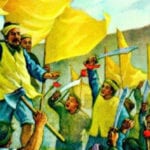 Weird Stuff
Weird Stuff  Weird Stuff
Weird Stuff  Health
Health Ten Confounding New Inventions from the World of Biomedicine
 Creepy
Creepy 10 Death Superstitions That Will Give You the Creeps
 Movies and TV
Movies and TV 10 Movies That Get Elite Jobs Right, According to Experts
 Weird Stuff
Weird Stuff 10 Times Real Laws Were Based on Bizarre Hypotheticals
 Animals
Animals 10 Inspiring Tales of Horses Being Human
 Mysteries
Mysteries Top 10 Haunting Facts About the Ghost Ship MV Alta
 History
History 10 Surprising Stories About the Texas Rangers
 Humans
Humans 10 Philosophers Who Were Driven Mad by Their Own Theories
 Miscellaneous
Miscellaneous 10 Video-Game-Worthy Weapons and Armors from History
 Weird Stuff
Weird Stuff 10 Warning Labels That Exist Because Someone Actually Tried It
 Health
Health Ten Confounding New Inventions from the World of Biomedicine
 Creepy
Creepy 10 Death Superstitions That Will Give You the Creeps
Who's Behind Listverse?

Jamie Frater
Head Editor
Jamie founded Listverse due to an insatiable desire to share fascinating, obscure, and bizarre facts. He has been a guest speaker on numerous national radio and television stations and is a five time published author.
More About Us Movies and TV
Movies and TV 10 Movies That Get Elite Jobs Right, According to Experts
 Weird Stuff
Weird Stuff 10 Times Real Laws Were Based on Bizarre Hypotheticals
 Animals
Animals 10 Inspiring Tales of Horses Being Human
 Mysteries
Mysteries Top 10 Haunting Facts About the Ghost Ship MV Alta
 History
History 10 Surprising Stories About the Texas Rangers
 Humans
Humans 10 Philosophers Who Were Driven Mad by Their Own Theories
 Miscellaneous
Miscellaneous 10 Video-Game-Worthy Weapons and Armors from History
10 Meetings That Shaped History
Meetings are not usually interesting. Anybody who has worked an office job knows that there are far too many of them. Some of the world’s most successful businesspeople have attempted to make them as short as possible in the belief that they otherwise do more harm than good. People sitting around a desk, arguing over details, and falling asleep: hardly the stuff of legend.
But it is possible for meetings to be radically more interesting than what we are accustomed to. If the definition of a meeting is allowed to include conferences and assemblies, then there is no shortage of meetings in which you certainly wouldn’t fall asleep. So here are ten occasions when people “sat around a table” and changed the course of history.
Related: 10 Facts Everyone Forgets About World War II
10 The Congress of Vienna
The year was 1814. Napoleon Bonaparte had swept across Europe in a manner not seen since the days of Julius Caesar before abdicating his throne and going into exile. The Congress of Vienna was therefore convened to decide the future of the continent after a century of constant warfare and civil unrest had rocked the Old World to its foundations.
Representatives from the Four Great Powers—Austria, Prussia, Britain, and Russia—agreed to reshape and balance European borders in a way that would prevent future conflict. France was cut down in size, while Prussia received significant territorial gains. A new German confederation was created. However, some critics argue that the Congress of Vienna was a reactionary response by traditional monarchs to the threat of liberal and revolutionary ideals.
Either way, the Congress of Vienna created a new continental order known as the Concert of Europe, which ensured relative peace and stability for a century. But that all came crashing down in 1914, and it is arguable that the Congress of Vienna directly paved the way for World War One.[1]
9 Bretton Woods
In 1944, with World War II still raging, 730 delegates from the Allied Nations gathered in an innocuous New Hampshire town. The name of the town? Bretton Woods. The USA, in particular, had realized that, once the war was concluded, several previously wealthy nations would need significant investment. This presented an opportunity to create something never before attempted in world history: a truly regulated international monetary system.
Officially entitled the United Nations Monetary and Financial Conference, this three-week gathering established the International Monetary Fund and a precursor to the World Bank, called the International Bank for Reconstruction and Development. From the end of WWII until 1973, the Bretton Woods Conference shaped global economic affairs and, by extension, geopolitics as a whole. It also represented the point at which America truly became the world’s foremost superpower, superseding their one-time rulers, the British.[2]
8 The First Council of Nicaea
It is hard to imagine what Christianity was like in its earliest years. Rather than a global organization with a clear hierarchy and defined set of beliefs, liturgies, and rules, it was once a hodge-podge collection of wildly differing groups.
That all changed at the First Council of Nicaea. Convened in AD 325 by Constantine I, the Roman emperor who made Christianity the state religion of Rome, its purpose was to set out exactly how Christianity would function as an organized religion. Of particular importance was the relationship between Jesus and God. While some believed that Jesus was a human, others believed he was the divine Son of God, and a third group thought Jesus and God were one and the same.
Constantine desperately wanted to avoid the brewing ecumenical conflict, and his Council managed to agree that Jesus was indivisible from God. This official recognition of the Holy Trinity was termed the Nicene Creed, and it has served as the binding theological foundation for organized Christianity ever since.[3]
7 The Yalta Conference
One of the most famous photographs of all time features the three most powerful men in the world sitting side-by-side, looking more like old friends than the leaders of World WarII’s victorious nations. Josef Stalin, Winston Churchill, and Franklin D. Roosevelt are the three men. In early 1945, they met in the Crimean resort of Yalta to discuss what would happen in the aftermath of an Allied victory. They agreed that prominent Nazis would be tried as war criminals, among other proposals.
Most conspicuous of these was Stalin’s promise that free elections would be held in Eastern Europe. This didn’t happen, and Communist governments were imposed on Bulgaria, Hungary, and several other states. As such, while the Yalta Conference would be followed by other, more formal assemblies to sort out the state of the world, it is this initial meeting that looms largest over post-war Europe. Indeed, it laid the basic foundations for the Cold War, which is the defining conflict of the late 20th century and our recent history.[4]
6 Themistocles Convinces the Athenians to Build a Fleet
Themistocles was an Athenian politician and general born in 524 BC. Although we do not know precisely when it happened, we do know that at a particular meeting of the Athenian assembly, Themistocles convinced his countrymen to build a fleet of 200 triremes. He even referred to an obscure prophecy from the Oracle at Delphi that predicted that Athens would be saved by a “wooden wall.”
This prophecy was proven true when the Persian king Xerxes invaded Greece. His huge army was halted temporarily by Spartans at the legendary Battle of Thermopylae, but the real turning point was at sea: the Battle of Salamis. The total destruction of the Persian fleet, mainly because of Athenian ships, stopped the Persian advance in its tracks. Had the Persians defeated the alliance of Greek cities, then the world today would be completely different. Democracy—not just the concept but even the word itself—might (maybe would) not exist in its current form. As such, that meeting of the Athenian assembly should be considered one of the most important in history.[5]
5 The Treaty of Rome
The European Union is the world’s second-biggest economy after the USA, and its population is the third-largest after India and China. In 2022, it is hard to imagine anything other than close cooperation between European countries. But war was the norm for a millennium. England, France, the German states, Spain, and Austro-Hungary are just a few of the great powers who fought constantly and viciously for centuries. The 18th century alone saw several million casualties in war, and there is no need to go over the horrors of the early 20th century.
https://www.thebalance.com/world-s-largest-economy-3306044
All that has now changed largely because of the European Union. Former enemies are now united not only by international agreements like NATO but also by a shared economy, open borders, and closer political ties than ever. None of this would have happened if not for the Treaty of Rome, signed in 1957 by France, West Germany, Belgium, Italy, Holland, and Luxembourg. The treaty founded the European Economic Community, which would one day become the European Union. Perhaps no meeting in history has brought nations closer together than the Treaty of Rome.[6]
4 The Great Schism
The Catholic Church and the Orthodox Church, by far the two biggest denominations of Christianity, were not always separate organizations. Their split goes back to the 11th century when existing theological and political disputes came to a dramatic conclusion. Although the Great Schism—as this split is called—was a long and gradual process, its defining moment took the form of a rather short meeting in 1054.
After years of constant tension, such as EasternChristianity’s roots in Greek philosophy compared with WesternChristianity’s focus on Roman law, the situation had become untenable. In April 1054, a papal delegation sent from Rome arrived in Constantinople, the home of Eastern Christianity. The planned meeting was cut short, however, when the papal delegates took issue with their hosts’ welcome and promptly stormed out. The subsequent religious division between West and East has since become a crucial element in European history. Indeed, it was only in 1965 that the mutual ex-communications of 1054 were finally revoked—over a thousand years later.[7]
3 The Treaty of Brest-Litovsk
Less famous than the Treaty of Versailles, which dealt with the aftermath of the First World War, is the Treaty of Brest-Litovsk. Its effects, however, are still being felt to this day. AfterLenin’s Communist Revolution and the fall of the Tsar, Russia wanted to withdraw from World War One. The Central Powers—Germany, Austria, the Ottoman Empire, and Bulgaria—accepted their withdrawal but foisted severe demands on the new Bolshevik Government. Eleven countries became independent across Europe and Asia, Germany gained territories in Poland and the Baltic, and Ukraine became a republic free from Russian control.
This treaty is of particular relevance because it has been used as a justification for Russia’s invasion of Ukraine. Not only that, but it is arguable that the 2008 attack on Georgia was also partially justified by the Treaty of Brest-Litovsk. Above all, it is beyond doubt that Putin personally views it as a huge mistake made by his ancestors and one which defines his own foreign policy goals.[8]
2 The Roman Senate Declares Caesar an Enemy of Rome
On the 7th of January in 49 BC, the Roman Senate gathered to discuss the growing power of Julius Caesar. Years of political tension between Rome’s two greatest generals, Caesar and Pompey, had led the republic to the brink of war. After a hurried debate, the Senate ordered Caesar to relinquish his military command. Caesar himself described this as “insulting” and “savage” and—as we know—refused to obey. He was, therefore, declared an “enemy of the state,” and from that point, there was no going back.
This meeting led directly to the civil war between Caesar and Pompey, which itself resulted in Julius Caesar’s victory and assumption of the title of “Dictator for Life.” Although further civil wars followed, the Roman historian Suetonius believed that 49 BC marked the end of the Roman Republic and the beginning of the Roman Empire. While it is impossible to know what would have happened if a civil war hadn’t broken out, it is clear that the Senate’s decision was of historical importance both for contemporary Rome and the rest of the world.[9]
1 Henry VIII Launches the Royal Navy’s First Mission
It is well known that the British Empire was the largest empire in history. Its rise to power was far from inevitable, however. If not for a meeting in the early 16th century, there may never have been a British Empire at all.
Having inherited just five warships from his father, Henry VIII had built over forty by his death and officially established the “Navy Royal.” In 1512, nineteen-year-old Henry VIII met with his advisors to discuss a war with France. They urged him not to, but Henry VIII pressed ahead. The success of subsequent naval engagements with France vindicated Henry’s desire to invest in the Royal Navy. And the rest—England’s emergence as the world’s greatest seafaring nation and subsequent global power—is history. Not only did the British Empire make English the global lingua franca, but it also channeled philosophical and political concepts around the world and has been a major power ever since. Had Henry’s advisors convinced him otherwise, then all of this may not have happened.[10]








